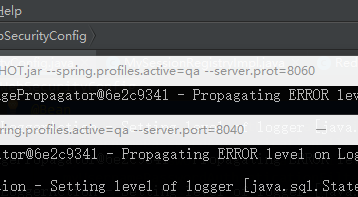SpringBoot,Security4, redis共享session,分布式SESSION并发控制,同账号只能登录一次
由于集成了spring session ,redis 共享session,导致SpringSecurity单节点的session并发控制失效,
springSession 号称 无缝整合httpsession,这个应该是没问题的,
但是为什么分布式情况下的session 并发依然是单节点呢?
因为session并发控制是第三方框架的 单节点缓存了session名单.我们要重写框架这一部分代码,把session名单存入到redis.
关于SpringSecruity的Session并发管理,看我另一篇随笔:
SpringBoot整合SpringSecurity,SESSION 并发管理,同账号只允许登录一次
废话说到,这里,看代码:
重写 SessionRegistry
** * Created by 为 on 2017-6-9. */ public class MySessionRegistryImpl implements SessionRegistry, ApplicationListener<SessionDestroyedEvent> { private static final String SESSIONIDS = "sessionIds"; private static final String PRINCIPALS = "principals"; @Resource private RedisTemplate redisTemplate; protected final Log logger = LogFactory.getLog(SessionRegistryImpl.class); // private final ConcurrentMap<Object, Set<String>> principals = new ConcurrentHashMap(); // private final Map<String, SessionInformation> sessionIds = new ConcurrentHashMap(); public MySessionRegistryImpl() { } public List<Object> getAllPrincipals() { return new ArrayList(this.getPrincipalsKeySet()); } public List<SessionInformation> getAllSessions(Object principal, boolean includeExpiredSessions) { Set<String> sessionsUsedByPrincipal = this.getPrincipals(((UserDetails)principal).getUsername()); if (sessionsUsedByPrincipal == null) { return Collections.emptyList(); } else { List<SessionInformation> list = new ArrayList(sessionsUsedByPrincipal.size()); Iterator var5 = sessionsUsedByPrincipal.iterator(); while (true) { SessionInformation sessionInformation; do { do { if (!var5.hasNext()) { return list; } String sessionId = (String) var5.next(); sessionInformation = this.getSessionInformation(sessionId); } while (sessionInformation == null); } while (!includeExpiredSessions && sessionInformation.isExpired()); list.add(sessionInformation); } } } public SessionInformation getSessionInformation(String sessionId) { Assert.hasText(sessionId, "SessionId required as per interface contract"); return (SessionInformation) this.getSessionInfo(sessionId); } public void onApplicationEvent(SessionDestroyedEvent event) { String sessionId = event.getId(); this.removeSessionInformation(sessionId); } public void refreshLastRequest(String sessionId) { Assert.hasText(sessionId, "SessionId required as per interface contract"); SessionInformation info = this.getSessionInformation(sessionId); if (info != null) { info.refreshLastRequest(); } } public void registerNewSession(String sessionId, Object principal) { Assert.hasText(sessionId, "SessionId required as per interface contract"); Assert.notNull(principal, "Principal required as per interface contract"); if (this.logger.isDebugEnabled()) { this.logger.debug("Registering session " + sessionId + ", for principal " + principal); } if (this.getSessionInformation(sessionId) != null) { this.removeSessionInformation(sessionId); } this.addSessionInfo(sessionId, new SessionInformation(principal, sessionId, new Date())); // this.sessionIds.put(sessionId, new SessionInformation(principal, sessionId, new Date())); Set<String> sessionsUsedByPrincipal = (Set) this.getPrincipals(principal.toString()); if (sessionsUsedByPrincipal == null) { sessionsUsedByPrincipal = new CopyOnWriteArraySet(); Set<String> prevSessionsUsedByPrincipal = (Set) this.putIfAbsentPrincipals(principal.toString(), sessionsUsedByPrincipal); if (prevSessionsUsedByPrincipal != null) { sessionsUsedByPrincipal = prevSessionsUsedByPrincipal; } } ((Set) sessionsUsedByPrincipal).add(sessionId); this.putPrincipals(principal.toString(), sessionsUsedByPrincipal); if (this.logger.isTraceEnabled()) { this.logger.trace("Sessions used by '" + principal + "' : " + sessionsUsedByPrincipal); } } public void removeSessionInformation(String sessionId) { Assert.hasText(sessionId, "SessionId required as per interface contract"); SessionInformation info = this.getSessionInformation(sessionId); if (info != null) { if (this.logger.isTraceEnabled()) { this.logger.debug("Removing session " + sessionId + " from set of registered sessions"); } this.removeSessionInfo(sessionId); Set<String> sessionsUsedByPrincipal = (Set) this.getPrincipals(info.getPrincipal().toString()); if (sessionsUsedByPrincipal != null) { if (this.logger.isDebugEnabled()) { this.logger.debug("Removing session " + sessionId + " from principal's set of registered sessions"); } sessionsUsedByPrincipal.remove(sessionId); if (sessionsUsedByPrincipal.isEmpty()) { if (this.logger.isDebugEnabled()) { this.logger.debug("Removing principal " + info.getPrincipal() + " from registry"); } this.removePrincipal(((UserDetails)info.getPrincipal()).getUsername()); } if (this.logger.isTraceEnabled()) { this.logger.trace("Sessions used by '" + info.getPrincipal() + "' : " + sessionsUsedByPrincipal); } } } } public void addSessionInfo(final String sessionId, final SessionInformation sessionInformation) { BoundHashOperations<String, String, SessionInformation> hashOperations = redisTemplate.boundHashOps(SESSIONIDS); hashOperations.put(sessionId, sessionInformation); } public SessionInformation getSessionInfo(final String sessionId) { BoundHashOperations<String, String, SessionInformation> hashOperations = redisTemplate.boundHashOps(SESSIONIDS); return hashOperations.get(sessionId); } public void removeSessionInfo(final String sessionId) { BoundHashOperations<String, String, SessionInformation> hashOperations = redisTemplate.boundHashOps(SESSIONIDS); hashOperations.delete(sessionId); } public Set<String> putIfAbsentPrincipals(final String key, final Set<String> set) { BoundHashOperations<String, String, Set<String>> hashOperations = redisTemplate.boundHashOps(PRINCIPALS); hashOperations.putIfAbsent(key, set); return hashOperations.get(key); } public void putPrincipals(final String key, final Set<String> set) { BoundHashOperations<String, String, Set<String>> hashOperations = redisTemplate.boundHashOps(PRINCIPALS); hashOperations.put(key,set); } public Set<String> getPrincipals(final String key) { BoundHashOperations<String, String, Set<String>> hashOperations = redisTemplate.boundHashOps(PRINCIPALS); return hashOperations.get(key); } public Set<String> getPrincipalsKeySet() { BoundHashOperations<String, String, Set<String>> hashOperations = redisTemplate.boundHashOps(PRINCIPALS); return hashOperations.keys(); } public void removePrincipal(final String key) { BoundHashOperations<String, String, Set<String>> hashOperations = redisTemplate.boundHashOps(PRINCIPALS); hashOperations.delete(key); } }
重写ConcurrentSessionControlAuthenticationStrategy
/** * Created by 为 on 2017-6-14. */ public class MyConcurrentSessionControlAuthenticationStrategy extends ConcurrentSessionControlAuthenticationStrategy { protected MessageSourceAccessor messages = SpringSecurityMessageSource.getAccessor(); private final SessionRegistry sessionRegistry; private boolean exceptionIfMaximumExceeded = false; private int maximumSessions = 1; public MyConcurrentSessionControlAuthenticationStrategy(SessionRegistry sessionRegistry) { super(sessionRegistry); Assert.notNull(sessionRegistry, "The sessionRegistry cannot be null"); this.sessionRegistry = sessionRegistry; } public void onAuthentication(Authentication authentication, HttpServletRequest request, HttpServletResponse response) { List<SessionInformation> sessions = this.sessionRegistry.getAllSessions(authentication.getPrincipal(), false); int sessionCount = sessions.size(); int allowedSessions = this.getMaximumSessionsForThisUser(authentication); if(sessionCount >= allowedSessions) { if(allowedSessions != -1) { if(sessionCount == allowedSessions) { HttpSession session = request.getSession(false); if(session != null) { Iterator var8 = sessions.iterator(); while(var8.hasNext()) { SessionInformation si = (SessionInformation)var8.next(); if(si.getSessionId().equals(session.getId())) { return; } } } } this.allowableSessionsExceeded(sessions, allowedSessions, this.sessionRegistry); } } } protected int getMaximumSessionsForThisUser(Authentication authentication) { return this.maximumSessions; } protected void allowableSessionsExceeded(List<SessionInformation> sessions, int allowableSessions, SessionRegistry registry) throws SessionAuthenticationException { if(!this.exceptionIfMaximumExceeded && sessions != null) { SessionInformation leastRecentlyUsed = null; Iterator var5 = sessions.iterator(); while(true) { SessionInformation session; do { if(!var5.hasNext()) { leastRecentlyUsed.expireNow(); ((MySessionRegistryImpl)sessionRegistry).addSessionInfo(leastRecentlyUsed.getSessionId(),leastRecentlyUsed); return; } session = (SessionInformation)var5.next(); } while(leastRecentlyUsed != null && !session.getLastRequest().before(leastRecentlyUsed.getLastRequest())); leastRecentlyUsed = session; } } else { throw new SessionAuthenticationException(this.messages.getMessage("ConcurrentSessionControlAuthenticationStrategy.exceededAllowed", new Object[]{Integer.valueOf(allowableSessions)}, "Maximum sessions of {0} for this principal exceeded")); } } public void setExceptionIfMaximumExceeded(boolean exceptionIfMaximumExceeded) { this.exceptionIfMaximumExceeded = exceptionIfMaximumExceeded; } public void setMaximumSessions(int maximumSessions) { Assert.isTrue(maximumSessions != 0, "MaximumLogins must be either -1 to allow unlimited logins, or a positive integer to specify a maximum"); this.maximumSessions = maximumSessions; } public void setMessageSource(MessageSource messageSource) { Assert.notNull(messageSource, "messageSource cannot be null"); this.messages = new MessageSourceAccessor(messageSource); } }
WebSecurityConfigurerAdapter
@Bean public MyUsernamePasswordAuthenticationFilter myUsernamePasswordAuthenticationFilter() throws Exception { MyUsernamePasswordAuthenticationFilter myUsernamePasswordAuthenticationFilter = new MyUsernamePasswordAuthenticationFilter(); myUsernamePasswordAuthenticationFilter.setPostOnly(true); myUsernamePasswordAuthenticationFilter.setAuthenticationManager(this.authenticationManager()); myUsernamePasswordAuthenticationFilter.setUsernameParameter("name_key"); myUsernamePasswordAuthenticationFilter.setPasswordParameter("pwd_key"); myUsernamePasswordAuthenticationFilter.setVerificationCodeParameter("verification_code"); myUsernamePasswordAuthenticationFilter.setRequiresAuthenticationRequestMatcher(new AntPathRequestMatcher("/checkLogin", "POST")); myUsernamePasswordAuthenticationFilter.setAuthenticationFailureHandler(simpleUrlAuthenticationFailureHandler()); myUsernamePasswordAuthenticationFilter.setAuthenticationSuccessHandler(authenticationSuccessHandler()); myUsernamePasswordAuthenticationFilter.setSessionAuthenticationStrategy(new MyConcurrentSessionControlAuthenticationStrategy(sessionRegistry)); return myUsernamePasswordAuthenticationFilter; }
开启两个服务,同一个账户登录不同的端口测试,能否被T下线




